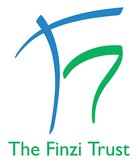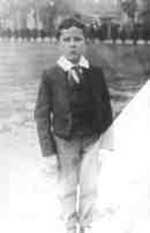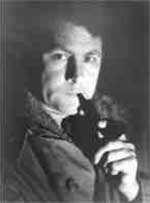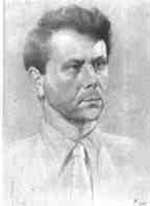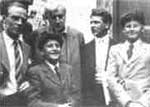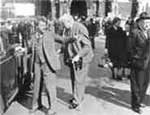Timeline
1901
Born in London, 14 July 1901
1915
During World War I the Finzi family settles in Harrogate. Gerald studies with Ernest Farrar, a pupil of Stanford and friend of Vaughan Williams.
1917
Between 1917 and 1922 studies privately with Sir Edward Bairstow at York Minster and attends his rehearsals and concerts with the York, Bradford and Leeds Choral Societies.
Born in London, 14 July 1901
1915
During World War I the Finzi family settles in Harrogate. Gerald studies with Ernest Farrar, a pupil of Stanford and friend of Vaughan Williams.
1917
Between 1917 and 1922 studies privately with Sir Edward Bairstow at York Minster and attends his rehearsals and concerts with the York, Bradford and Leeds Choral Societies.
|
1921
Ten Children's Songs, Op.1, settings of poems by Christina Rossetti for voices and piano (1920-21) 1922 Prelude for Strings, Op.25 By Footpath and Stile, Op.2, song-cycle for baritone and string quartet (1921-22, rev.1934) 1923 Moves to Painswick in Gloucestershire A Severn Rhapsody for chamber orchestra ‘The Brightness of this Day’, Christmas Hymn (1922-23) Two Motets for chorus and orchestra or organ (1922-23) [unpublished] 1924 Requiem da camera for baritone, chorus and orchestra [unpublished] A Severn Rhapsody performed in Bournemouth by Sir Dan Godfrey, and published by the Carnegie Trust. |
|
1925
Following advice from Adrian Boult, takes a counterpoint course with RO Morris. Moves to London where he becomes friends with young composers Howard Ferguson and Edmund Rubbra, and meets Vaughan Williams, Holst and Bliss for the first time. Two Sonnets by JohnMilton , Op.12, for tenor or soprano and small orchestra Introit, Op.6, the central movement of the Violin Concerto. Composed two ‘arias’, which emerged in the later works Farewell to Arms, Op.9, and Dies natalis, Op.8. 1926 Three Short Elegies, Op.5, for unaccompanied chorus Nocturne (from New Year Music, Op.7) for orchestra 1927 Till Earth Outwears, Op.19, for high voice and piano: the earliest songs in this collection date from this year Violin Concerto Revised version 1928 Vaughan Williams conducts the Violin Concerto at a Bach Choir concert, after which Finzi withdrew the work except for the slow movement, later published as Introit, Op.6 Romance, Op.11, for string orchestra ‘Fantasia’ from Grand Fantasia and Toccata, Op.38, for piano and orchestra To a Poet, Op.13a, settings to various poets (published posthumously) Oh Fair to See, Op.13b, the earliest songs found in these posthumous collections date from this period. I Said to Love, Op.19b, for baritone and piano 1929 A Young Man’s Exhortation, Op.14, for tenor and piano (1926-29) The Fall of the Leaf, Op.20, for orchestra Eclogue, Op.10, for piano and strings (late 1920s, revised late 1940s) 1930 Teaches at the Royal Academy of Music until 1933 |
1932
New Year Music, Op.7, performed under Sir Dan Godfrey in Bournemouth
Earth and Air and Rain, Op.15, for baritone and piano (1928-32)
1933
First complete performance of A Young Man’s Exhortation, Op.14, in London.
Marries the artist Joyce Black, with Ralph and Adeline Vaughan Williams as witnesses, and settles at Aldbourne in Wiltshire
1934
Begins to work on behalf of Ivor Gurney, cataloguing his manuscripts
1935
First works published by Boosey & Co and Hawkes & Son, including Earth and Air and Rain, Op.15
1936
Interlude, Op.21, for oboe and strings (1932-36)
1937
Seven Poems of Robert Bridges, Op.17
1938
Finzi continues his work in support of Ivor Gurney. He is a driving force behind a Music and Letters symposium, and behind the eventual publication of five volumes of songs and two collections of poems by Gurney
Prelude and Fugue, Op.24, for string trio
1939
Moves to newly-built Church Farm at Ashmansworth, near Newbury. Outbreak of war causes the cancellation of the premiere of Dies natalis at the Three Choirs Festival, a major performance which could have established his career as a composer
Dies natalis, Op.8, for tenor or soprano and strings
New Year Music, Op.7, performed under Sir Dan Godfrey in Bournemouth
Earth and Air and Rain, Op.15, for baritone and piano (1928-32)
1933
First complete performance of A Young Man’s Exhortation, Op.14, in London.
Marries the artist Joyce Black, with Ralph and Adeline Vaughan Williams as witnesses, and settles at Aldbourne in Wiltshire
1934
Begins to work on behalf of Ivor Gurney, cataloguing his manuscripts
1935
First works published by Boosey & Co and Hawkes & Son, including Earth and Air and Rain, Op.15
1936
Interlude, Op.21, for oboe and strings (1932-36)
1937
Seven Poems of Robert Bridges, Op.17
1938
Finzi continues his work in support of Ivor Gurney. He is a driving force behind a Music and Letters symposium, and behind the eventual publication of five volumes of songs and two collections of poems by Gurney
Prelude and Fugue, Op.24, for string trio
1939
Moves to newly-built Church Farm at Ashmansworth, near Newbury. Outbreak of war causes the cancellation of the premiere of Dies natalis at the Three Choirs Festival, a major performance which could have established his career as a composer
Dies natalis, Op.8, for tenor or soprano and strings
|
1940
Founds and conducts the Newbury String Players, a small, mainly amateur body with which he gives enterprising concerts in a wide area around his home until his death. Many young musicians and composers, including Julian Bream and Kenneth Leighton, are offered the chance of performance, and Finzi revives and edits music by William Boyce, Richard Capel Bond, John Garth, Richard Mudge, John Stanley, and Charles Wesley Dies natalis, Op.8, performed in London, 26 January 1941 Works for Ministry of War Transport until 1945. His home is opened to German and Czech refugees |
1942
Let Us Garlands Bring, Op.18, five settings of songs by Shakespeare for baritone & piano (1929-42), later orchestrated for baritone & strings
1943
Five Bagatelles, Op.23, for clarinet and piano (1938-43)
1944
Introduction to Farewell to Arms, Op.9, for voice and small orchestra (1944)
1945
Farewell to Arms performed by the BBC Northern Orchestra under Charles Groves
Let Us Garlands Bring, Op.18, five settings of songs by Shakespeare for baritone & piano (1929-42), later orchestrated for baritone & strings
1943
Five Bagatelles, Op.23, for clarinet and piano (1938-43)
1944
Introduction to Farewell to Arms, Op.9, for voice and small orchestra (1944)
1945
Farewell to Arms performed by the BBC Northern Orchestra under Charles Groves
1946
‘Lo, the full, final sacrifice’ performed; also Dies natalis at the Three Choirs, Hereford
‘Lo, the full, final sacrifice’, Op.26, a festival anthem for choir and organ, later orchestrated
Love’s Labour’s Lost, Op.28, music for Shakespeare’s play for BBC Home Service Radio production
1947
For St Cecilia performed at the Royal Albert Hall under Boult
Love’s Labour’s Lost, Op.28a, arrangement for voice and small orchestra (1946-47)
For St Cecilia, Op.30, for tenor, chorus and orchestra (1946-47)
‘My lovely one’ a choral anthem from Three Anthems, Op.27
1948
Broadcasts a talk on Parry, and over the following years orders Parry’s manuscripts for placing in the Bodleian Library
‘Lo, the full, final sacrifice’ performed; also Dies natalis at the Three Choirs, Hereford
‘Lo, the full, final sacrifice’, Op.26, a festival anthem for choir and organ, later orchestrated
Love’s Labour’s Lost, Op.28, music for Shakespeare’s play for BBC Home Service Radio production
1947
For St Cecilia performed at the Royal Albert Hall under Boult
Love’s Labour’s Lost, Op.28a, arrangement for voice and small orchestra (1946-47)
For St Cecilia, Op.30, for tenor, chorus and orchestra (1946-47)
‘My lovely one’ a choral anthem from Three Anthems, Op.27
1948
Broadcasts a talk on Parry, and over the following years orders Parry’s manuscripts for placing in the Bodleian Library
|
1949
Conducts premiere of Clarinet Concerto with Frederick Thurston and the London Symphony Orchestra at the Three Choirs, Hereford Before and After Summer published Clarinet Concerto, Op.31 (1948-49) Before and After Summer, Op.16 for baritone and piano (1932-49) 1950 Intimations of Immortality performed at the Three Choirs, Gloucester Intimations of Immortality, Op.29, ode for tenor, chorus and orchestra (late 1930s, 1949-50) 1951 Learns he suffers from Hodgkin’s Disease and has ten years or less to live; presents a paper on John Stanley to the Royal Musical Association ‘God is gone up’ a choral anthem for choir and organ or choir and orchestra from Three Anthems, Op.27 Let us now praise famous men, Op.35, two-part songs for unaccompanied male voices |
|
1952
Love’s Labour’s Lost Suite for small orchestra performed, Cheltenham Festival Magnificat, Op.36, for soloists, chorus and orchestra or organ 1953 ‘White-flowering days’, Op.36, for unaccompanied chorus (1952-53) ‘Welcome, Sweet and Sacred Feast’ choral anthem from Three Anthems, Op.27 Grand Fantasia and Toccata, Op.38, for piano and orchestra 1954 All-Finzi concert at the Festival Hall includes the first London performance of the Grand Fantasia and Toccata Begins editing a volume of Boyce overtures for Musica Britannica In terra pax, Op.39, for soloists, chorus, strings & percussion, re-scored in 1956 1955 Composes Cello Concerto for the Cheltenham Festival at the request of Sir John Barbirolli Delivers the Crees lectures at the Royal College of Music on ‘The Composer’s Use of Words’ In terra pax broadcast Cello Concerto (1951-55) Love’s Labour’s Lost, Op.28b, Suite for small orchestra 1956 Dies at Oxford, 27 September In terra pax (rescored version) performed at the Three Choirs, Gloucester |
